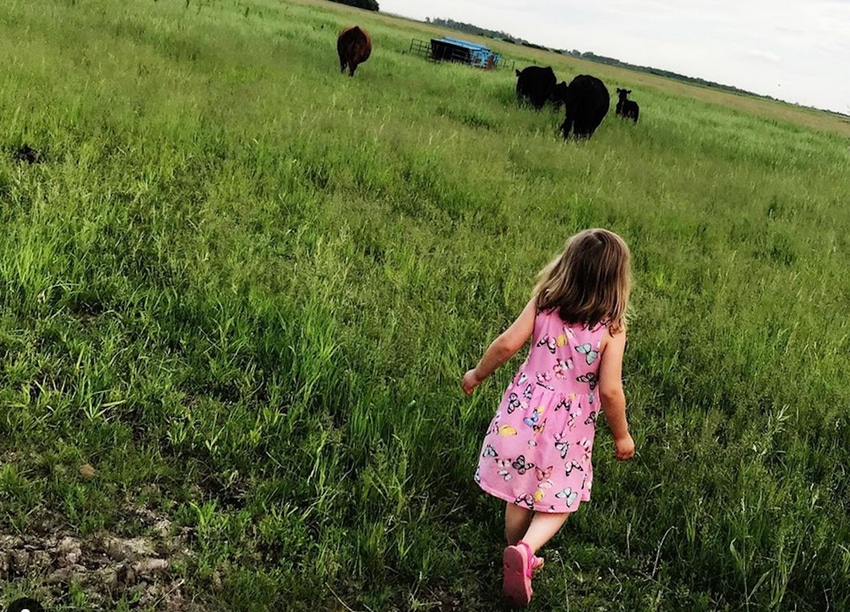Ranch life offers built-in lessons for developing kids’ characters.
June 24, 2019

Over the weekend, we spent some time in the barn together as a family, unloading square bales in preparation for the winter calving season.
While Tyler and I worked, the kids played and “supervised.” And while I’m not going to rush these toddler years by any means, I’m sure looking forward to the day when they can sling bales alongside us.
As we unloaded the bale rack, our five-year old daughter Scarlett asked me, “Why do we spend so much time in the barn?”
I answered, “Because we're ranchers, and we have to take care of our cattle.”
And with all of the honesty and naivety of a little girl, she replied with gusto, “Mom, we aren't ranchers; we are Radkes.”
Kids say the darnedest things, don’t they? Her train of thought gave us a chuckle, but we still took a minute to explain what exactly a “rancher” does. She seemed satisfied with our answer, and we were able to get back to the task at hand.
And with each chore or responsibility we tackle on the ranch, it is my hope that I’m emulating more to my kids than just hard work and time spent in the barn. I want to raise kids who are kind, empathetic, responsible, inquisitive, generous, nurturing and knowledgeable.
I believe there are many built-in lessons that can be gained from doing honest ranch work, and by instilling a little bit of the “cowboy way” in our kids, they will have the integrity and moral character as adults that is truly earned by getting your hands dirty and callused on the ranch.
In raising good kids, I recently read a few articles on this topic that really resonated with me. The first, which was featured on Her View From Home and written by Whitney Fleming, was titled, “I don’t want to raise good-on-paper kids.”
Fleming writes, “That’s the problem today in our overscheduled-, overachieving-, overzealous-about-our-children’s-success culture. We are creating good-on-paper kids. We are focused on building up resumes, instead of filling up hearts.
“So, we’ve made tough choices in our family this year, even when they haven’t been popular. We chose sports clubs based on culture instead of competitiveness. We picked classes based on interests instead of labels such as honors and AP. We are planning more family outings instead of driving to more planned activities. We want to volunteer and donate more and spend less.
“And although my kids may not look as strong on paper as other kids, I feel like I have more time to encourage them in their hobbies and passions. I am a more patient mother. I can pour more love into these girls every single day.
“My end goal is to send kids out into this world who are happy, who know how to cope, and who know how to care for themselves and others when life gets tough. I never see a line for that on a resume.”
Read the entire article by clicking here.
The second article on this topic was written by Mitch Daniels for The Washington Post and is titled, “In farm children, I see virtues that one sees too rarely these days.”
Daniels writes, “During a decade in elected office in Indiana, I made it my practice while traveling the state to stay overnight in Hoosier homes rather than hotels. Because of geography and, candidly, personal choice, probably a third of those 125 overnights were with farm families. There I witnessed virtues that one sees too rarely these days — hard work, practical manual skill, a communitarian ethic — woven tightly into the fabric of everyday life.
“I saw teenagers and even younger siblings rising at 5 a.m. to feed animals or do other chores before cleaning up and heading to school. It was fun to return home and tell those stories to four suburban daughters whose idea of a tough assignment was clearing the table and washing the dishes.
“At county fairs, I would always ask that the 4-H officers be the ones to take me around. Every one of those young people had raised animals for competition, and they showed me projects — artistic, scientific or community service — with the special pride that comes from creative, arduous individual effort.”
In this season of life that I’m in, I’m cognizant that there are little eyes and ears watching and listening to everything we say and do. I want my children to observe parents and the people around them who are doing good and serving the community around them. Thankfully, these lessons can begin on the ranch, where character is best developed with a pitchfork in hand.
The opinions of Amanda Radke are not necessarily those of beefmagazine.com or Farm Progress.
About the Author(s)
You May Also Like





